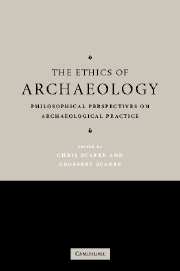Book contents
- Frontmatter
- Contents
- List of contributors
- Acknowledgements
- 1 Introduction
- PART I THE OWNERSHIP OF CULTURAL OBJECTS
- 2 Cultures and the ownership of archaeological finds
- 3 Who guards the guardians?
- 4 Is culture a commodity?
- 5 Moral arguments on subsistence digging
- PART II ARCHAEOLOGISTS AND THE LIVING
- PART III ARCHAEOLOGISTS AND THE DEAD
- PART IV THE COMMON HERITAGE OF HUMANKIND?
- References
- Index
4 - Is culture a commodity?
Published online by Cambridge University Press: 05 June 2012
- Frontmatter
- Contents
- List of contributors
- Acknowledgements
- 1 Introduction
- PART I THE OWNERSHIP OF CULTURAL OBJECTS
- 2 Cultures and the ownership of archaeological finds
- 3 Who guards the guardians?
- 4 Is culture a commodity?
- 5 Moral arguments on subsistence digging
- PART II ARCHAEOLOGISTS AND THE LIVING
- PART III ARCHAEOLOGISTS AND THE DEAD
- PART IV THE COMMON HERITAGE OF HUMANKIND?
- References
- Index
Summary
The commodification of culture poses questions concerning value, ownership and ethics both in terms of those marketing culture and, more specifically, with regard to the role of anthropologists and archaeologists in facilitating or challenging the process. Here we look at ethical issues that arise in two contexts: where there is tension between the status of artefacts as commodities and as cultural property, and where rights to cultural property are contested.
Culture consists of learned patterns of thought and behaviour that are characteristic of a particular community. Culture includes beliefs, values, language, political organisation and economic activity; also technology, art and material culture. A commodity is an item that can be freely bought and sold through the market economy. In a narrow sense, commodities are raw materials or primary agricultural products, but the term can be extended to any useful or valuable thing that has a price, payment of which transfers ownership from the seller to the buyer. All commodities (even raw materials) are cultural artefacts in the sense that demand for them is culturally constructed. The market economy is itself a cultural phenomenon.
Although culture is shared, anthropologists no longer think of it as a ‘collective consciousness’ (Durkheim 1915) but rather follow Bourdieu's (1977) concept of habitus, which stresses the interaction between ideas and their material expression. When Bourdieu attempted to discover the structure of culture among the Kabyle people of Algeria, he found each individual carried a slightly different mental model. Bourdieu termed this mental schema the individual's habitus.
- Type
- Chapter
- Information
- The Ethics of ArchaeologyPhilosophical Perspectives on Archaeological Practice, pp. 46 - 68Publisher: Cambridge University PressPrint publication year: 2006
- 8
- Cited by



